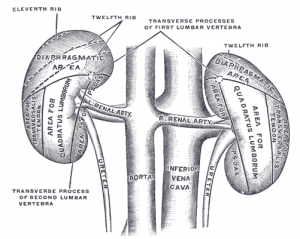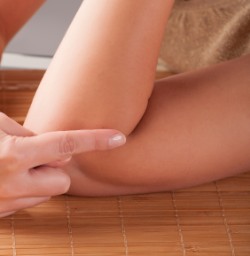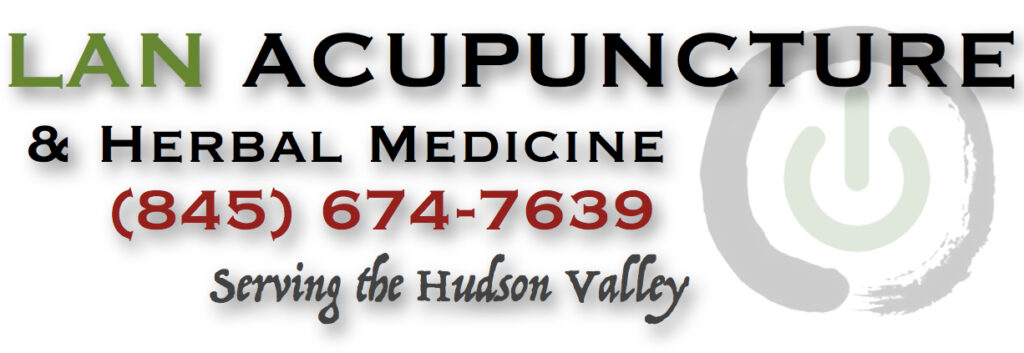[retweet][facebook]
 New research finds acupuncture effective for reducing high blood pressure and preventing damage to the kidneys. Acupoint LI11 LocationIn a controlled laboratory experiment, researchers applied two acupuncture points to laboratory rats with hypertension and renal interstitial fibrosis, a kidney disease characterized by destruction of the renal tubules and capillaries. Acupuncture “significantly decreased” blood pressure and decreased “damage of kidney morphology.”
New research finds acupuncture effective for reducing high blood pressure and preventing damage to the kidneys. Acupoint LI11 LocationIn a controlled laboratory experiment, researchers applied two acupuncture points to laboratory rats with hypertension and renal interstitial fibrosis, a kidney disease characterized by destruction of the renal tubules and capillaries. Acupuncture “significantly decreased” blood pressure and decreased “damage of kidney morphology.”
Three groups were compared. Group 1 received acupuncture. Group 2 was a control group and group 3 received pharmaceutical medication. The drug group received perindopril, an ACE inhibitor used for the treatment of high blood pressure and other forms of heart disease. The acupuncture group received electroacupuncture at LI11 (Quchi) and ST36 (Zusanli) for a period of 20 minutes, once per day. Blood pressure, kidney morphology, optical densities of kidney collagen with immunohistochemistry, and expression of TGF-beta1 mRNA with reverse transcription polymerase chain reaction method changes were measured.
The acupuncture group had similar results as the medication group in that TGF-beta1 mRNA expression was decreased. The acupuncture group showed significantly lower blood pressure and less pathological structural changes to the kidneys. The pathological depositional area of collagen in the acupuncture group also showed clinical benefits with a significant reduction of both type I and type III collagen. The researchers concluded that acupuncture at LI11 and ST36 “probably intervenes the process of RIF (renal interstitial fibrosis) by reducing synthesis of kidney type I, III collagen and restraining expression of TGF-beta1.”
This new research supports research released last month. Investigators measured the effectiveness of acupuncture for the treatment of hypertension in a human clinical case study. Two acupuncture points were identical across both studies: ST36, LI11. Additionally, the human study included LI4, ST9, CV6, CV6 and SP6. The patient showed significant reductions in both systolic and diastolic blood pressure.
Another recent investigation conducted jointly at the University of California, Los Angeles and University of California, Irvine uncovered how acupuncture lowers blood pressure. The investigators discovered that acupuncture reduces hypertension by stimulating brain neurons to decrease neural activity in the rostral ventrolateral medulla (rVLM) to stimulate a decrease in SNS activity thereby reducing blood pressure.
 The UC (University of California) researchers “have shown that electroacupuncture stimulation activates neurons in the arcuate nucleus, ventrolateral gray, and nucleus raphe to inhibit the neural activity in the rVLM in a model of visceral reflex stimulation-induced hypertension.” The UC researchers concluded that acupuncture reduces hypertension through downregulation of excess sympathetic nerve activity.
The UC (University of California) researchers “have shown that electroacupuncture stimulation activates neurons in the arcuate nucleus, ventrolateral gray, and nucleus raphe to inhibit the neural activity in the rVLM in a model of visceral reflex stimulation-induced hypertension.” The UC researchers concluded that acupuncture reduces hypertension through downregulation of excess sympathetic nerve activity.
Three acupuncture groups were compared. Group 1 received electroacupuncture at P5, P6, LI10 and LI11. Group 2 received LI4, LU7, ST36 and ST37 electroacupuncture stimulation. Both groups showed decreases in hypertension with group 1 showing the greatest reduction in blood pressure. Group 3 received electroacupuncture at LI6, LI7, K1, UB67. This group did not have the clinical benefits as in groups 1 and 2. As a result, the researchers conclude that electroacupuncture is effective in the reduction of hypertension and the effects are point specific.
Excerpt from:
